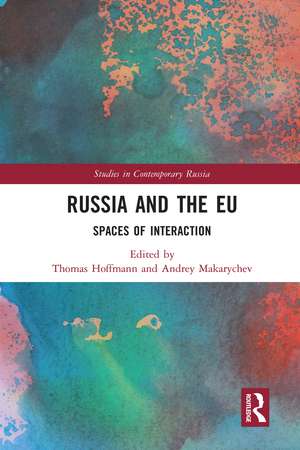Russia and the EU: Spaces of Interaction: Studies in Contemporary Russia
Editat de Thomas Hoffmann, Andrey Makarycheven Limba Engleză Paperback – 30 iun 2020
Previously coherent and institutionalized spaces of communication and dialogue between Moscow and Brussels have fragmented into relations that, while certainly not cooperative, are also not necessarily adversarial. Exploring these spaces, contributors consider how this indeterminacy makes cooperation problematic, though not impossible, and examine the shrunken, yet still existent, expanse of interaction between Russia and the EU. Analysing to what extent Russian foreign policy philosophy is compatible with European ideas of democracy, and whether Russia might pragmatically profit from the liberal democratic order, the volume also focuses on the practical implementation of these discourses and conceptualizations as policy instruments.
This book is an important resource for researchers in Russian and Soviet Politics, Eastern European Politics and the policy, politics and expansion of the European Union.
Din seria Studies in Contemporary Russia
-
 Preț: 311.91 lei
Preț: 311.91 lei -
 Preț: 326.49 lei
Preț: 326.49 lei -
 Preț: 311.18 lei
Preț: 311.18 lei -
 Preț: 416.22 lei
Preț: 416.22 lei -
 Preț: 384.09 lei
Preț: 384.09 lei -
 Preț: 384.48 lei
Preț: 384.48 lei -
 Preț: 385.25 lei
Preț: 385.25 lei -
 Preț: 383.50 lei
Preț: 383.50 lei -
 Preț: 365.87 lei
Preț: 365.87 lei -
 Preț: 385.62 lei
Preț: 385.62 lei - 17%
 Preț: 259.31 lei
Preț: 259.31 lei -
 Preț: 394.19 lei
Preț: 394.19 lei -
 Preț: 382.75 lei
Preț: 382.75 lei -
 Preț: 389.66 lei
Preț: 389.66 lei -
 Preț: 389.66 lei
Preț: 389.66 lei - 9%
 Preț: 934.94 lei
Preț: 934.94 lei -
 Preț: 311.18 lei
Preț: 311.18 lei - 18%
 Preț: 1055.06 lei
Preț: 1055.06 lei
Preț: 260.93 lei
Preț vechi: 311.91 lei
-16% Nou
Puncte Express: 391
Preț estimativ în valută:
49.93€ • 52.26$ • 41.56£
49.93€ • 52.26$ • 41.56£
Carte tipărită la comandă
Livrare economică 31 martie-14 aprilie
Preluare comenzi: 021 569.72.76
Specificații
ISBN-13: 9780367588205
ISBN-10: 036758820X
Pagini: 270
Dimensiuni: 156 x 234 mm
Greutate: 0.5 kg
Ediția:1
Editura: Taylor & Francis
Colecția Routledge
Seria Studies in Contemporary Russia
Locul publicării:Oxford, United Kingdom
ISBN-10: 036758820X
Pagini: 270
Dimensiuni: 156 x 234 mm
Greutate: 0.5 kg
Ediția:1
Editura: Taylor & Francis
Colecția Routledge
Seria Studies in Contemporary Russia
Locul publicării:Oxford, United Kingdom
Public țintă
PostgraduateCuprins
The EU and Russia: space of interaction in times of crisis: an introduction Part I Cultures and philosophies 1. Democratic repertoires of political legitimization: Russian echoes and European realities 2. Russian cultural policy: from European governance towards conservative hegemony 3. Russia’s monuments policy in the Baltic States 4. Russian World(s) in Vienna: agents, compatriots, and people Part II Policies and politics 5. National conservative parties in Baltic- Nordic Europe: no countries for Putin’s men 6. The political discourse of the Kremlin in Spain: channels, messages, and interpretive frameworks 7. Russia’s strategy of influence in Europe: a French case study 8. Russian threat as a push factor in the European integration discourse in Poland 9. The European Union and Russia in the contested South Caucasus: how to move forward Part III Legal norms and practices beyond the (EU)rope 10. Defending its rights or testing the limits? Trade relations and disputes between Russia and the EU before and after the Ukraine crisis 11. Who may sail the Arctic? Russia’s and the EU’s perspectives on the legal status of the Northern sea route 12. The institution of citizenship and practices of passportization in Russia’s European neighbourhood policies Part IV Methodological conclusion How to study and teach anew EU– Russia relations: a methodological conclusion in seven points
Notă biografică
Thomas Hoffmann, PhD, is Associate Professor for Private Law at Tallinn Law School, Tallinn University of Technology, Estonia.
Andrey Makarychev is Guest Professor at the Johan Skytte Institute of Political Science, University of Tartu.
Andrey Makarychev is Guest Professor at the Johan Skytte Institute of Political Science, University of Tartu.
Recenzii
"Hoffmann and Makarychev’s volume provides a compelling and in-depth account of the dramatic deterioration of EU-Russia relations. As post-Cold war models of the relationship fade, this book provides all those wishing to make sense of the new normal in EU-Russia relations with an essential chart to navigate the complexities of a fragmented relationship, which is neither cooperative nor, however, always conflictual." - Nathalie Tocci, Director of the Istituto Affari Internazionali and Honorary Professor at the University of Tübingen
Descriere
This book explores how recently coherent and institutionalized spaces of communication and dialogue between Moscow and Brussels have fragmented into relations that, while certainly not cooperative, are also not necessarily adversarial.
